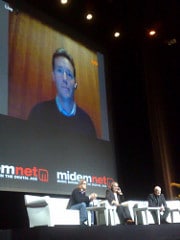 An extraordinary spectacle to open this weekend’s big MidemNet digital music conference in Cannes, France. MP3.com founder Michael Robertson, named on the speaker agenda, couldn’t be here in person after all – because terms of EMI’s lawsuit against his MP3Tunes music site prevented him being on stage with ex EMI Music CEO Eric Nicoli.
An extraordinary spectacle to open this weekend’s big MidemNet digital music conference in Cannes, France. MP3.com founder Michael Robertson, named on the speaker agenda, couldn’t be here in person after all – because terms of EMI’s lawsuit against his MP3Tunes music site prevented him being on stage with ex EMI Music CEO Eric Nicoli.
Instead, Robertson appeared above Nicoli’s head, on the big screen from California via video link – a potent reminder the gulf between labels and technologists is still all too wide, the legal animosity all too prescient.
EMI under Nicoli issued a 2007 takedown notice to MP3Tunes, which lets users upload tracks to play via a web locker, and accompanying Sideload, which lets users copy over any tracks found online, then sued both Robertson and his company proper after Terra Firma acquired the label.
“EMI has sued us and sued me personally,” Robertson said. Nicoli’s response: “Michael uses the example that we were suing technologies – we’re not suing technologies, we’ve said about a thousand times. If people use technology to knowingly break the law, they shouldn’t be shocked if someone brings them up on it.”
But Nicoli didn’t come across as one of the music industry dinosaurs, explaining EMI was the first major to drop DRM because “we should trust people in the full knowledge that some people would abuse that”. And he admitted labels like his have made several critical errors, comparing the music biz to Wall Street…
— Labels’ mistakes: “Mistakes were made, as they were in most industries, most recently banking – this industry is essentially change-averse, essentially technophobic, so they were unhelpful traits when the digital opportunity did arrive. “We did find it impossible to collaborate with digital in the early years of this decade … a function of most of the majors aspiring to be the gatekeeper of digital music; there was no collaboration for a couple of years That was exacerbated by regulation – you couldn’t go for a pee alongside a competitor with out a regulator pouring antitrust over you.”
— Physical piracy: “(P2P) didn’t just represent an opportunity for a new way of distributing content illegally, but also physical piracy was enhanced by digital technology. Trends in physical piracy from the beginning of this decade increased quite dramatically in some developed countries from low levels to alarming levels because CD burning allowed for distribution to a quality that was indistinguishable from the real product.”